Picture this: You’re finally ready for that long-awaited springtime camping trip, only to discover your camper has been invaded by uninvited guests – mice! These pesky rodents can cause extensive damage and pose serious health risks. So, how do you keep mice out of the camper?
How To Keep Mice Out Of The Camper
- Understand the mouse menace & why they target campers
- Utilize a multilayered approach
- Inspect and seal your camper
- Try Natural Deterrents
- Utilize Electronic Deterrents
- Carefully manage food storage
- Consider humane vs other measures
Understanding the Mouse Menace
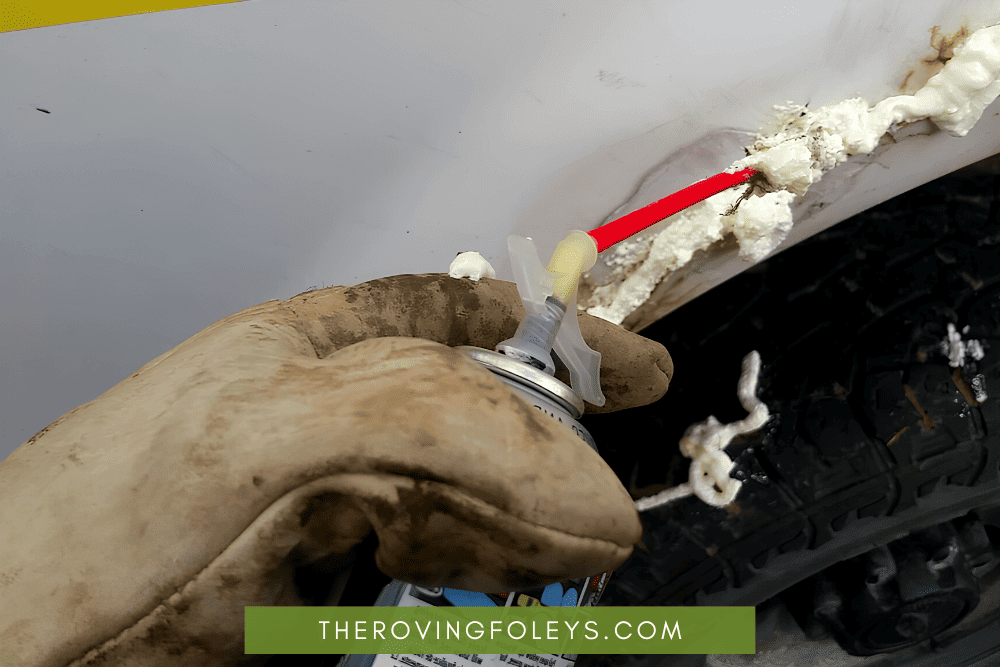
Mice in your RV are more than just a nuisance; they can lead to serious problems. They tend to target campers for the warmth, food, and nesting materials they provide, causing damage to wiring, plumbing, and spreading diseases.
Once one mouse gets inside they will begin to multiply and do damage in less than a week. The longer they stay in your camper, the more damage they can cause, making it crucial to address the issue as soon as possible.
Taking action quickly is the best way to prevent a mice infestation from getting out of hand.
Reasons Mice Target Campers
These little critters are drawn to the food and shelter that campers provide. They can easily chew through wires, pipes, and other materials to make their way inside. Once in, they’ll feast on food items, pet food, paper towels, and even toilet paper, turning your camper into their personal buffet.
This makes it necessary to take preventative measures to deter rodents from entering your home away from home.
Dangers of a Mouse Infestation
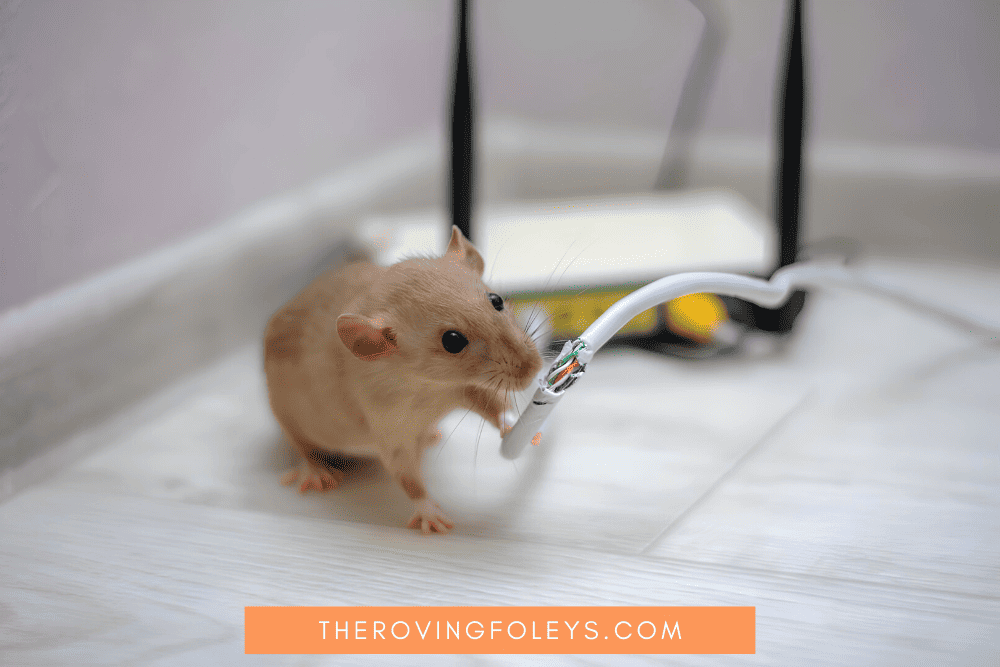
A mouse infestation can lead to extensive damage, health risks, and unpleasant odors in your camper. Mice can spread deadly diseases like Hanta Virus, Bubonic Plague, and Salmonellosis among others.
Moreover, the damage they cause to your camper’s wiring and plumbing can be costly to repair. Therefore, it’s essential to implement preventative measures to maintain a clean and safe environment.
Inspection and Sealing: The First Line of Defense
The first step in preventing mice from entering your camper is to identify and seal potential entry points. Mice can enter through even the smallest holes, so it’s crucial to conduct a thorough inspection both inside and outside your camper. Look for any cracks or gaps in the walls, windows, and doors.
Any areas where wiring, pipes, etc penetrate the body of the rig are prime spots for mice to attack.

Exterior Inspection Tips
Begin your inspection by examining the exterior of your camper for any gaps or small openings. Pay special attention to spots where wires, pipes, or other conduits pass through the RV’s design. Look for any small holes through the exterior or underneath that would allow mice inside. Once you’ve identified any potential entry points, seal them using:
- foam
- caulk
- sheet metal rings
- steel wool
- copper mesh screens
This will help deter rodents and other pests from entering your camper.
Check the interior of your camper for any signs of rodent activity. Look for droppings.
Interior Inspection Techniques
The interior of your camper deserves equal attention during your inspection. Focus on areas where pipes and wires enter, and seal any openings with spray foam or caulking to keep the environment clean.
Don’t forget to wear gloves when handling mouse droppings and other signs of mouse activity. By sealing these entry points, you can prevent mice from invading your living space and causing damage.
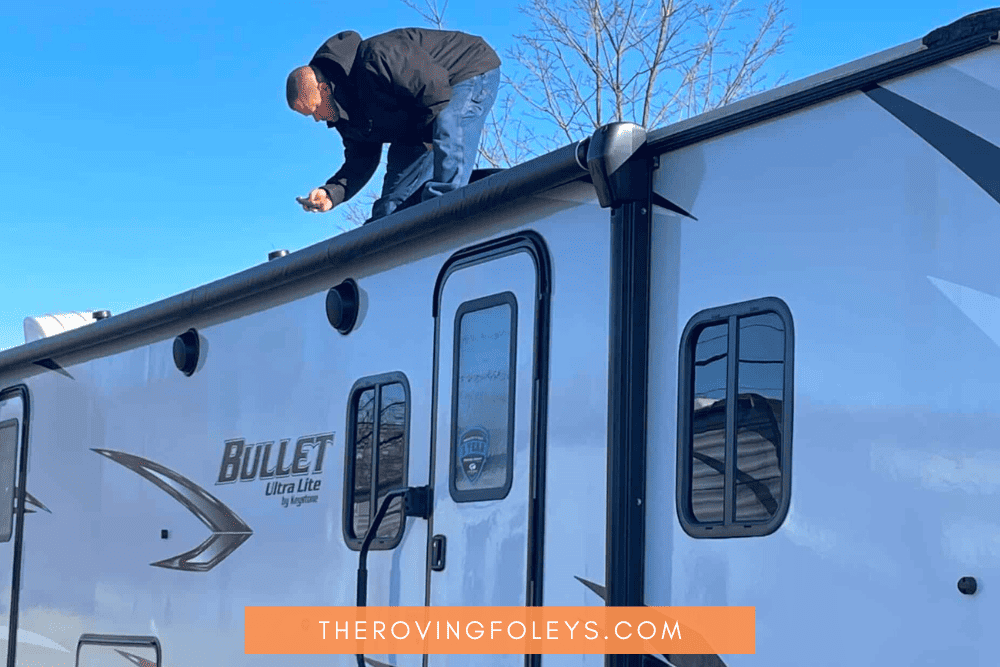
Natural Mouse Deterrents:
Keeping mice out of your camper can be achieved through various natural remedies that are both effective and eco-friendly.
Peppermint Oil:
One reliable method is peppermint oil, which emits a strong scent that repels rodents due to its overwhelming nature. Just soak cotton balls in the oil and scatter around the RV. Mice dislike the smell of peppermint and will go elsewhere. You can also use peppermint oil spray all around the rig to help keep mice away.
The pros of using peppermint oil include its pleasant aroma for humans and non-toxic nature, making it safe around pets and children. However, its effectiveness may vary, and you may need to reapply it frequently to maintain its potency.
Another similar method is to use cinnamon essential oils. You could pick the scent you prefer.
Deterrent Pouches
Another option is using natural deterrent pouches containing ingredients like cedar chips or lavender. These pouches release a scent that mice find unpleasant, deterring them from entering your camper.
The advantage of these pouches is their long-lasting effects, often lasting up to several months. On the downside, they might not be as potent as other methods and may require multiple pouches to cover a large camper area adequately.
Natural Predators
Finally, utilizing natural predators like cats, if you’re comfortable with pets, can provide a sustainable and ongoing solution for keeping mice away. The presence of cats will naturally discourage mice from approaching your camper.
Nevertheless, caring for a pet involves responsibility, and not everyone may be willing or able to accommodate a feline companion in their camper.
Dryer Sheets

Scented fabric softener sheets are widely considered to be a good and cheap deterrent for mice. Lavender is well known to repel mice so is a good scent to get. Dryer sheets are very easy to spread all around your rig, inside storage compartments and under furniture, and one box goes a long way.
Fresh Cab Pouches
Fresh Cab Pouches
- Made with balsam fir oil, this non-toxic plant-based alternative freshens and protects our storage areas for up to 90 days
- Meets federal EPA standards for professional pest control use/effectiveness in indoor/enclosed areas.
- Simply place one pouch for every 125 square feet.
Fresh Cab is a pre-made pouch product that uses botanicals (balsam fir oil) to repel critters. They do have mixed reviews on Amazon, but most are very positive.
Irish Spring Bar Soap
Irish Spring bar soap has long been hailed as an effective mouse repellent. Many people swear that it deters mice- others say mice love it and will even eat it. You will see pictures of where mice chewed the bars. We have used it ourselves as part of a multilayered approach and we did not get mice.
However there are quite a few people out there who say it has no effect so choose for yourself. Our thoughts- why not try!
Fox or Coyote Urine
YES, you can actually buy coyote urine! This would obviously be for use OUTSIDE the RV. Simply spray around the underside of the rig, or spread handy crystals around the perimeter- especially around the jack stands and wheels where mice will begin their assault. The smell triggers a flight response in mice moving them to safer grounds.
Electronic Repellent Choices
Electronic repellents use either high frequency sound or electromagnetic waves to make critters uncomfortable to the point that they leave. There are a great many products on the market (especially ultrasonic) so there is quitea a bit of choice. We have shown a few examples of some of the best selling/ best reviewed models.
Ultrasonic Devices
Ultrasonic Mouse Deterrent
- The ultrasonic waves can stimulate the brain and auditory nervous system of pests.
- Can cover an area of 80 to 120 square meters.
- Works with low frequency ultrasonic waves, which are difficult for humans to hear.
One popular option is ultrasonic repellent devices that emit high-frequency sound waves, which are unbearable for mice and other rodents. These devices are compact and easy to install, making them a convenient choice for camper owners.
One of the main advantages of ultrasonic repellents is that they do not involve harmful chemicals, making them safe for both humans and pets. However, their effectiveness can vary depending on the brand and model, and they may not work on all types of mice.
Since they emit sound waves, they cannot transmit through walls so you need one in every room. The science on these devices is questioned by many.
Electromagnetic Pulse Devices
Another electronic remedy is electromagnetic pulse devices, which utilize the camper’s electrical wiring to create an electromagnetic field that interferes with mice’s nervous systems, driving them away.
The benefit of this method is that it covers a larger area than individual repellent devices, providing comprehensive protection for your camper. On the downside, these devices may interfere with other electronic equipment, and there is limited scientific evidence to support their effectiveness.
Motion Activated Traps
Electronic Instant Kill Trap
- Humane, High-Voltage Shock – Once inside, the circuit triggers a high-voltage shock.
- A safety switch automatically deactivates the trap when opened.
- The removable kill chamber allows you to easily discard dead rodents without ever having to touch or view it.
These traps use traditionsl “live catch” technology to trap mice and rats. Once inside an high voltage electric charge is delivered to kill the rodent within seconds. There are lights to let you know that the trap has been sprung, and the “kill chamber” can then be removed to dispose of the dead varmint.
Electronic remedies are a humane way to help keep rodents at bay. However, many of these do consume electricity, which could be a concern for those camping in remote areas with limited power resources. Others use batteries which will need to be replaced from time to time.
Despite these potential cons, electronic remedies offer a technological edge in pest control, and when used properly, can be a very effective tool in your anti-mouse arsenal.
It’s important to consider your individual needs and preferences when selecting the best electronic repellent for your camper.
Handling a Mouse Infestation: Humane and Other Solutions
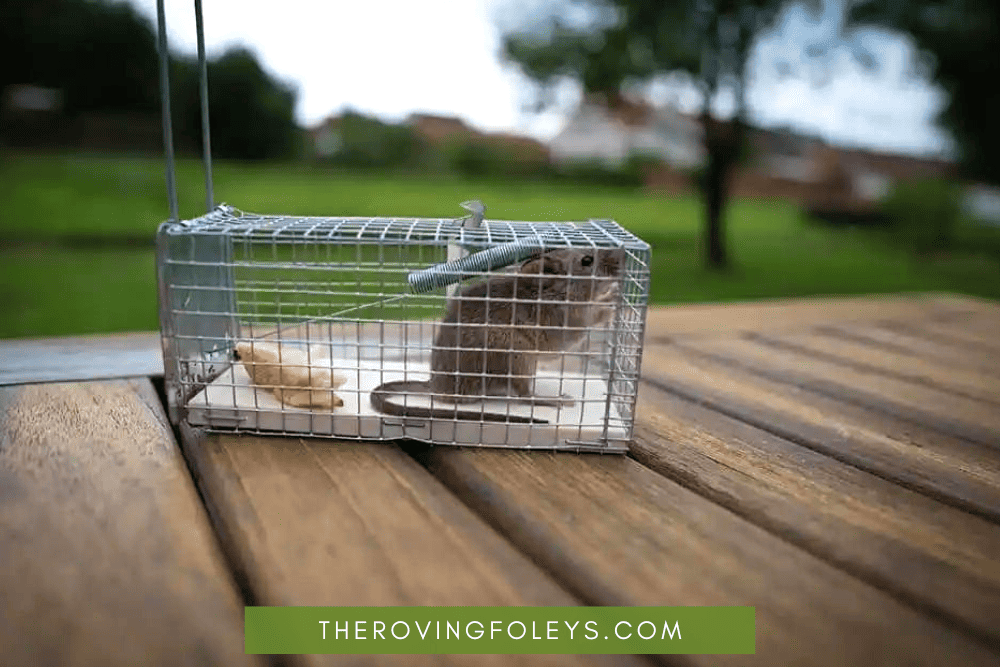
When faced with a rodent infestation in your camper, it’s important to consider both humane and other solutions. While it may be tempting to resort to drastic measures to eliminate the problem, it’s crucial to think about the welfare of the mice as well as the potential impacts on the environment and other animals.
Humane solutions include using traps to capture the mice and then releasing them in a safe area.
Humane Trapping Methods
No-kill mouse traps are an effective and compassionate method for dealing with mouse infestations in campers. Bait these traps with enticing food items like peanut butter, and once the mouse enters, it will be trapped without harm.
By opting for humane traps, you can address the issue in a responsible and caring manner.
Traps and Poisons
Traditional traps and poisons are very effective and will catch and kill mice. Spring traps, sticky traps, and poison feeders have a very good track record. And if you are fed up and have the stomach for it, you can be assured that your unwanted guests will face a certain and miserable death.
However these traps and poisons can lead to potential harm to other animals and the environment.
When dealing with a mouse problem, keeping mice out of your camper is essential. To achieve this, avoid actions that may attract mice and promptly remove any dead mouse, ensuring a clean and pest-free environment.
Maintaining a Clean, Mouse-Proof Camper
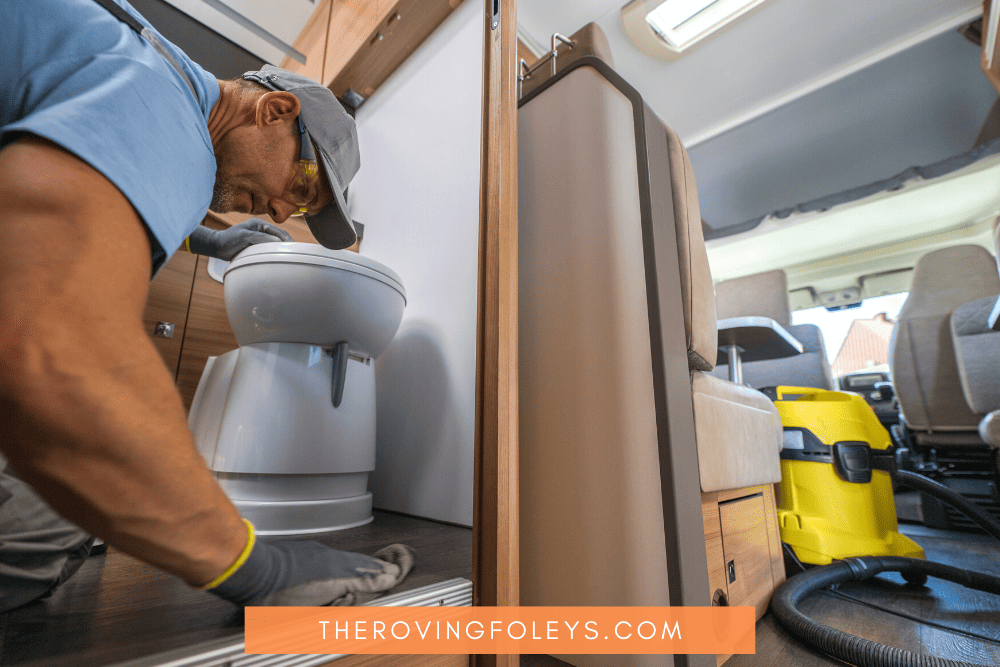
Like many issues with RV’s, the best offence is a good defense. Keeping the rig pest free in the first place is far prefferable to fighting an infestation.
Proper food storage, regular cleaning, and maintenance are essential for maintaining a clean and mouse-proof camper. By keeping your camper clean and free from easily accessible food sources, you’ll make it less appealing to mice, reducing the chances of an infestation.
Food Storage Guidelines
Store food in airtight containers to prevent attracting mice. Additionally, remove all the food items from your camper while it’s in storage to further deter mice from making your camper their home.
By taking these precautions, you can significantly reduce the likelihood of a mouse infestation.
Cleaning and Maintenance Practices
Clean up food debris to reduce opportunities for mice to find nesting materials. Store items like toilet paper and paper towels off the ground. Routinely inspect your camper for signs of mice presence and address any issues immediately to prevent infestations from escalating.
By adhering to these cleaning and maintenance practices, you’ll keep your camper in top condition and free from uninvited guests.
RELATED ARTICLES:
Summary
In conclusion, keeping mice out of your camper requires a multi-layered approach, including inspection and sealing, the use of natural and electronic deterrents, proper food storage, and regular cleaning and maintenance.
By implementing these strategies, you can enjoy your camping trips without the worry of uninvited guests causing damage to your home away from home.
Frequently Asked Questions
How do I mouse proof my RV?
Spray foam is an effective way to mouse proof your RV – locate any potential entry points and spray foam into those areas to block mice from entering.
Make sure it’s been properly hardened so they can’t get in.
Does Irish Spring keep mice out of campers?
It looks like Irish Spring soap could be a good way to keep mice out of campers, as the strong scent can act as a natural repellent.
The soap is easy to find in stores and relatively inexpensive, making it a great option for campers who want to keep mice away. It can be placed around the perimeter of the camper, or even inside the camper itself.
Do fabric softener sheets keep mice out of camper?
Dryer sheets may help keep mice away temporarily, but they are not a long-term solution since mice can adapt to the odor.
Are mice common in campers?
Mice are fairly common in campers that have been stored outdoors for extended periods of time, so it’s best to keep your camper in a garage or on hard surfaces like concrete if possible.
This will help to reduce the chances of mice getting into your camper and causing damage.
How do electronic repellents work to deter mice from entering my camper?
Electronic repellents emit frequencies that deter mice from entering your camper, helping to keep them away and protect your camper.

Frank Foley
Frank is the Head Hubby, Daddy, and Fix-It Guy of the Roving Foleys clan. He ia an avid traveler and has spent over 5 years traveling full time with his family. he loves helping others learn about the RV life. He has also traveled in Europe, Asia, and Australia with his wife Grainne.



